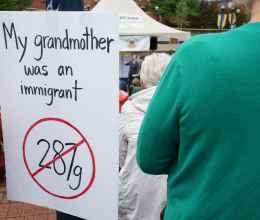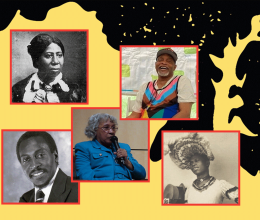
Immigrants' rights are more important now than ever. And one pressing issue on the minds of many in Maryland is that the 287(g) program continues to plague us. The program deputizes local and state law enforcement to enforce federal immigration laws. Currently, Frederick, Cecil, and Harford counties still have this racist, anti-immigrant program in place.
Why is this a problem?
- Immigration enforcement should be the job of federal agents, not local police who need trust with community members to create real public safety for all, and who are not trained in the same way as federal agents are to do their job.
- Racial profiling and discrimination makes Black and Brown people targets for anti-immigrant police stops, detention, and deportation.
- We divert limited funds to enforce a federal job.
A couple years back, the ACLU of Maryland shared data in Seven Truths Surrounding 287(g) Programs showing just how racist immigration enforcement is in Maryland. Now, we have the latest data showing the same depressing results.
In both 2019 and 2020, 96 percent of those who were deported were from Latin America, which includes the Caribbean*. Even though the United States is home to many diverse cultures and faces, the statistics point to an unfair, xenophobic, and racist system.
Recent data from the Pew Research Center showed that in 2018, Latinx/e* immigrants made up 44 percent of the immigrant population in the U.S, white immigrants made up 18 percent, Asian immigrants made up 27 percent, and Black immigrants made up 9 percent. And shockingly, those who were from Latin America, including all parts of the Caribbean, made up around 98 percent of deportations during that same year.
In 2020, immigrants emigrated from all over the world. Yet, according to the data from the Department of Homeland Security, the top countries of origin for people who were deported were all Latin American countries, including the Caribbean.
It is disturbingly clear: Black and Brown people are being unfairly targeted for deportation and immigrant detention.
In 2019, the longest any person was held in immigration detention was a person from Rwanda, who was held for 10 years. Immigrants from Africa or the Caribbean made up about 4 percent of the people in ICE detention*, yet represented 24 percent of all solitary confinement lockups over 2012 to 2017. According to researchers Franco, Parker, and Reiter, that means Black immigrants are six times more likely to be sent to solitary confinement. Overpolicing and the over incarceration of Black people in the U.S. also affects Black immigrants within the immigration system in similar ways.
Not only are immigrants from Africa and the Caribbean detained for longer and put in solitary confinement more often, but immigration bonds, the money amount an immigration judge sets for immigrants to buy their freedom while their immigration cases are pending, also tend to be higher for those immigrants, as well. Haitians, who are predominately Black, have much higher bonds than the average immigrant. The average bond is $10,500, but for Haitians it was $16,170 from 2018 to 2020 – almost double the average. This is one of the reasons immigrants from Africa and the Caribbean are detained for longer because of these massive bonds.
Black and Brown immigrants are unfairly targeted by police. The consequence of this should not be deportation. It is unacceptable that Black and Brown immigrants are detained for longer and deported at much higher rates than other immigrants. We need an end to programs like 287(g) that enable this racist system and funnel Black and Brown immigrants through the unfair deportation system. It’s time for the U.S. to enact a just, equitable, and humane immigration system.
*NOTES
- Latinx/e means someone who is of Latin America origin. It means either Latinx or Latine, whichever one you prefer. Latinx and Latine are gender-inclusive terms.
- Unfortunately, ICE does not track data on race or ethnicity. They only track data on country of origin. While Latinx/e people can be of any race, many countries are predominantly Black and/or Brown, including in the Caribbean.
- When we say Latin America, we are including Mexico, Central America, South America, and the entire Caribbean.






